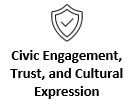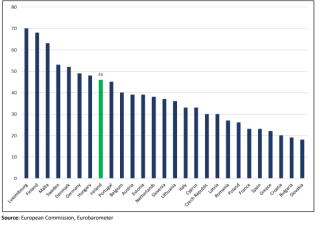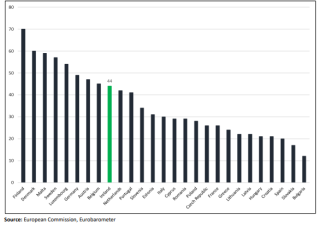Towards Wellbeing For All - Civic Engagement, Trust, and Cultural Expression

The Programme for Government acknowledged that our “existing measures of economic performance fail to measure matters such as damage to the environment and voluntary work. They also overlook equality of opportunity, distribution of wealth and income and only value public expenditure on the basis of the inputs used, not the outcomes achieved” and committed to introducing a series of indicators that would more accurately measure wellbeing to provide a “holistic view of how our society is faring”.
A ‘Wellbeing Dashboard’ was then developed to provide a snapshot of progress. In developing the Dashboard, the Inter-Departmental Working Group established a list of 35 indicators chosen to be balanced, add value or be of policy relevance, provide for aggregation and dis-aggregation, be readily available and of sufficient quality, and be internationally comparable.
So how are we doing? To gauge public opinion on what matters, and what should therefore be counted as an indicator of Well-being, Social Justice Ireland produced a survey asking people to rank a set of six indicators under each of the Well-being Framework dimensions from one to six, with one being the least important and six being the most important. The six indicators included the indicators used in the Dashboard and datasets readily available from the CSO and other reputable sources. This survey was circulated over the Summer months through our social media channels, our Weekly Digest, and our Members Bulletin. What follows is based on the responses to this survey and our policy proposals under each of the 11 dimensions.
The eleventh dimension in the Wellbeing Framework relates to civic engagement, trust, and cultural expression. Specifically, the “rights and opportunities an individual has to impact the political functioning of their society, the existence of institutional arrangements that foster cooperation and freedom of expression of identity and non-discrimination, and trust in those institutions and across broader society”.
The proportion of people who stated that they were satisfied with how democracy works in Ireland was 76 per cent in Spring 2021, which was fifth highest in Europe. As referenced above, the proportions of the population who responded positively to the questions “How much trust do you have in the national Government / national Parliament?” asked on behalf of the European Commission as part of the Standard Eurobarometer in Summer 2022 were 46 and 49 per cent respectively, compared to 49 per cent who tended not (European Commission, 2022) (Charts 1 and 2). European comparison is also available within this dataset. Ireland (at 46 per cent) ranks comparatively highly (8th) and is 12pps ahead of the EU-27 average in terms of trusting national Government, and ranks 9th in terms of trusting the national Parliament, 10pps above the EU-27 average.
Chart 1: % Population with trust in Irish Government

Chart 2: % Population with trust in Irish Parliament

Voter turnout for General Election 2020 was 62.9 per cent. This is a decrease of 2.2pps on General Election 2016. [1]
The Register of Lobbying was introduced in 2015 to increase transparency and accountability, making information available to the public on the identity of those lobbying designated public officials and the nature of those lobbying activities. According to its Annual Report for 2020, there were 2,085 registered lobbyists and almost 11,600 returns had been received by the Commission in Regulating Lobbying, a increase on the previous year when a reported 9,600 returns were made. Health was the number one topic. While this increased transparency is to be welcome, the question of what, if any, effect it is having on a cultural shift from vested to public interest remains. Greater attention must be drawn to the information available on the Lobbying Register.
Finally, we turn to perceived social inclusion, where Ireland scores 7.5 out of 10. Students have the highest social inclusion score (8), while people who are unable to work due to permanent sickness / disability (6.3) and the unemployed (6.4) had the lowest. This data is extracted from the SILC Wellbeing Module.[2]
Policy Priorities
Promote deliberative democracy and a process of inclusive social dialogue to ensure there is real and effective monitoring and impact assessment of policy development and implementation using an evidencebased approach at local and national level.
Include, in the Commission for Regulating Lobbying’s Annual Reports, policy areas with the greatest lobbying activity, the lobbying organisations and the designated public officials engaged to highlight to the general public those influencing the political decision-making process.
[1] https://data.oireachtas.ie/ie/oireachtas/libraryResearch/2020/2020-02-2…
[2] https://www.cso.ie/en/releasesandpublications/ep/p-smwb/silcmoduleonwel…